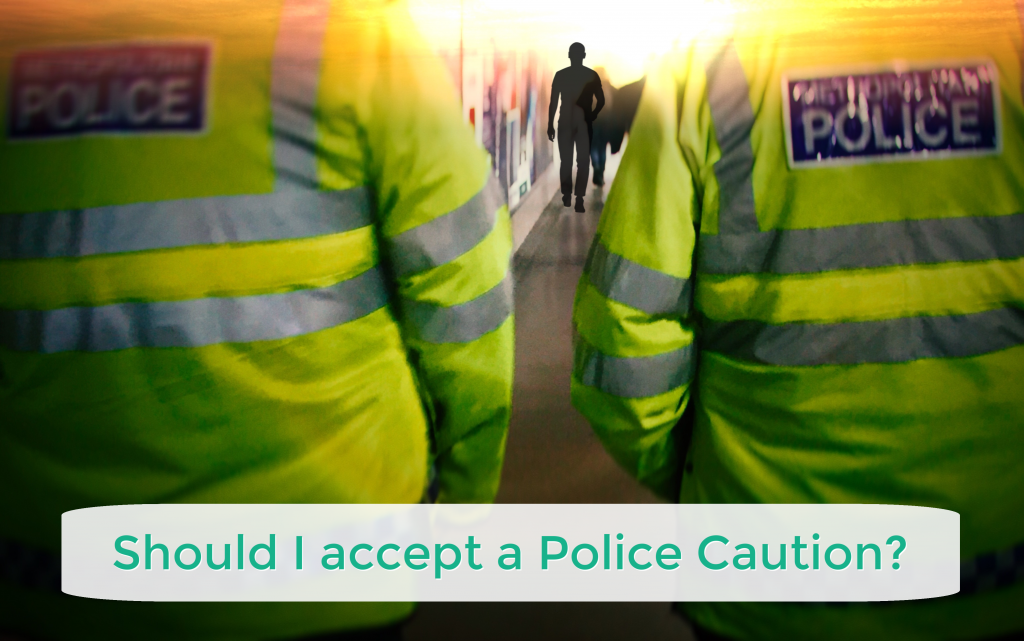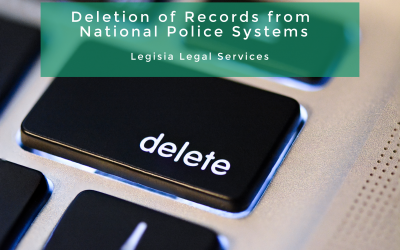Should I Accept a Police Caution?
Should I accept a police caution? We are often asked by clients whether they should accept a police caution.

Should I accept a police caution?
Should I accept a police caution?
We are often asked by clients whether they should accept a police caution.
Whether to accept a police caution is not a small matter as it will remain on police records until you reach 100 years of age.
A police caution can cause issues on travel overseas, DBS background checks, and other things like adoption or even being involved in school activities with your children.
Police Cautions and arrests
If you have been accused of crime, often you will have been arrested and taken into police custody.
If the offence is relatively minor, such as a low level assault, theft or minor drugs offence, then the police may consider offering you a simple police caution, or a conditional caution.
Accepting a Police Caution whilst in Detention
If you have been arrested and detained at the police station, very often you will not be given much time to reflect on your decision to accept a caution or not.
You will have been arrested, put in a cell, then taken for interview, possibly with a solicitor depending on whether you elected to have representation or not, then placed back in the police cell to contemplate whether you would like to accept the police caution.
Sometimes the police will make suspects make an on the spot decision to accept a police caution, even without conducting a formal interview. In such circumstances there is not much time for reflection, and the pressure to accept the police caution can be overwhelming.
Period for Reflection
The police are not supposed to force suspects into making an “instant decision” on whether to accept a police caution. The police are supposed to allow suspects to “consider the matter and, if need be, take independent legal advice.”
Sometimes the police may however use subtle tactics to coerce a suspects, or undermine a suspects right to legal advice.
For example, the police might tell a suspect that it will take ages for a solicitor to arrive, and/or tell them that if they just admit the office, the will get off with a “slap on the wrists”.
Sometimes there may be more overt coercion, but in our experience this is much more rare – the police are subject to complaints procedures, and much (but not all) of what goes on in the police station is recorded, and so the police are often careful about what they say when issuing a caution. We have however seen a number of cases where officers have clearly overtly misled suspects about the impact of a police caution.
Even if the police are being straight forward in their dealings with suspects, the caution procedure by its very nature does put pressure on suspects to confession and accept a caution – namely either you take the caution or matters will get much worse….
Release on Bail or Voluntary interviews.
Sometimes suspects will be release on bail pending enquiries, or a suspect will not be arrested, and will be interviewed as a volunteer.
In these circumstances there will be time for a suspect to take legal advice outside of the police station setting (were the police have a psychological advantage over most suspects) and a decision on what a suspect ought to do can be made with a greater degree of detachment.
If you have been bailed or you are under “voluntary” investigation, and you have been offered the possibly of a police caution, then we can help you decide whether it is the best option for you.
If may be the case that accepting a police caution is the best option in your case. Not all cases are winnable, and if you refuse the caution there is a possibility that the police will charge you.
What happens if I refuse to accept a police caution?
If you refuse to accept a caution, the police have two options (and one unofficial one).
The police (or CPS if your case has been referred for a decision) can either choose to drop your case, taking “no further action” – this is commonly know as NFA, or charge you.
If the police can conclude that your case should not be dropped, they will refer your matter to the CPS to be charged. You will then be sent to court for a prosecution, where you will either be found guilty or acquitted.
Depending on the seriousness of your case your matter will either be heard before a Magistrates’ Court, or you will be sent to the Crown Court for trial (or you will elect to go to the Crown Court).
Will I make matters worse if I refuse a police caution?
If you are convicted at court, this will undoubtedly be worse than a caution – a conviction will be disclosed for a longer period of time than a caution on DBS checks, and there is no possibility of expungement of your record, other than via successful appeal to a superior Court.
If you have a police caution, you will have the possibility of applying for deletion of your record, a decision to delete your record rests solely with the police, is discretionary, and is not a public process (unless matters proceed to judicial review, which is mainly for only the most contentious cases).
Refusing a Police caution and the Police
If you do refuse to accept a caution offer to you by the police, the third (unofficial) option the police have is effectively to try to persuade you into accepting one.
This does happen, and in our opinion it is not often born out of a deliberately malicious intent by the police, but through a genuine belief that accepting a caution is best for all parties – it is cheaper, less time consuming, has less implications in terms of disclosure (although serious implications remain) and avoids an embarrassing and stressful court process.
Officers often do not understand the full implications of the caution, misunderstanding the impact on overseas travel and employment.
Of course there will be cases where officers are simply being mendacious, and they just want to push a police caution on a suspect out of spite, or some other reason, but more often than not we believe the reasons are more related to ignorance of the rules, or workload pressures to solve cases quickly.
Police Caution Expert Lawyers
If you are considering accepting a police caution that has been offered to you, or you have accepted one and wish you hadn’t, then please get in touch.
We have applied for the deletion of hundreds of records, over many years, and we have succeeded in the vast majority of our case.
We are a dedicated legal practice specialising in the deletion of criminal records, challenging unfairly issued police cautions and arrest records, appealing DBS cases and defending disciplinary proceedings related to criminal allegations.
We offer reasonable fixed fees to all our clients – you will therefore know the exact cost of your case in advance.
Please get in touch to discuss your case in confidence with an expert criminal records solicitor.
Contact Us
Related Articles
Related
Can Local Police Records be Deleted?
In the recent High Court judgment of AB v Chief Constable of British Transport Police [2022] the court ordered the deletion of locally retained police records.Can Local Police Records be Deleted?Can Local Police Records be Deleted?In the recent High Court judgment of...
Police Caution Removal Solicitor
If you have received a police caution, we are experts in police caution removal.Police Caution Removal SolicitorPolice Caution Removal SolicitorIf you have received a police caution, we are experts in police caution removal. We are a dedicated legal practice focusing...
The HCPC and Police Cautions
If you have received a police caution, and you are currently regulated by the Health and Care Professions Council (HCPC), or you hope to be, then you will need to consider the HCPC’s rules on the disclosure of criminal records.The HCPC and Police CautionsThe HCPC and...
Can Local Police Records be Deleted?
In the recent High Court judgment of AB v Chief Constable of British Transport Police [2022] the court ordered the deletion of locally retained police records.Can Local Police Records be Deleted?Can Local Police Records be Deleted?In the recent High Court judgment of...
Police Caution Removal Solicitor
If you have received a police caution, we are experts in police caution removal.Police Caution Removal SolicitorPolice Caution Removal SolicitorIf you have received a police caution, we are experts in police caution removal. We are a dedicated legal practice focusing...
The HCPC and Police Cautions
If you have received a police caution, and you are currently regulated by the Health and Care Professions Council (HCPC), or you hope to be, then you will need to consider the HCPC’s rules on the disclosure of criminal records.The HCPC and Police CautionsThe HCPC and...
Deletion of Records from National Police Systems
It is possible to apply for the deletion of your records from National Police Systems, namely the Police National Computer (PNC), the National DNA Database (NDNAD) and also the National Fingerprint Database (IDENT1).Deletion of Records from National Police...

Head Office
Legisia Legal Services
The North Colchester Business Centre
340 The Crescent
Colchester
Essex, CO4 9AD
Cases are conducted nationwide & internationally
Additional consultation Address (Not Postal)
50 Liverpool Street
London EC2M 7PY




